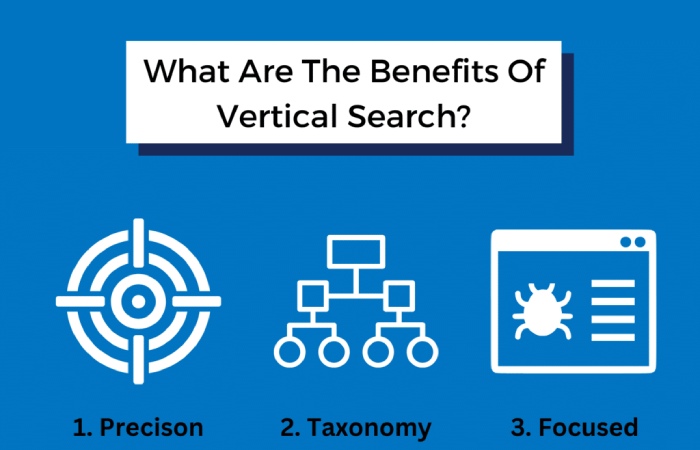Table of Contents
What is Vertical Search?
Vertical search – or specialty or topical search – is a term used to describe niche or specialty search engines that focus on a single industry vertical, type of content – or a specific segment of the overall search.
For this reason, the list of vertical search engines can get oddly specific and virtually impossible to cover in one place, but a few notable examples include:
- In-platform eCommerce product search engines, like Amazon, eBay, and Etsy
- Vacation rental engines, like Airbnb and HomeAway
- Travel search engines, like Skyscanner
- Employment search engines like Indeed and Glassdoor
- Local search engines, like Yelp
Unlike general search engines like Google, which aim to index and search the entire Web before showing you relevant results, this engines will focus on a limited data set instead.
In other words, vertical search engines only search a specific part of the Web; the user plunges into a single, distinct topic.
That said, even though Google is a general-purpose search engine, it also features a network of vertical search tools. They still rely on Google’s core search functions – but are filtered differently based on user requirements and restricted to a specific category.
What are the Benefits of Vertical Search?

Vertical searches offer benefits over general search engines for precision, taxonomy, and web crawler focus.
1. Precision
The scope is limited since vertical searches only focus on industry-specific terms and content. It means you can get more accurate search results because the results are only from the industry you specifically searched for.
For example, if you search for “hotels in Bali,” Google will bring up anything with those keywords. But, if you search for the same term on a vertical search engine like Airbnb, you can get far better results with much more detail and accuracy.
2. Taxonomy
In the context of search engines, taxonomy refers to the classification methods that help improve search results’ relevance in vertical search engines.
Simply put, Taxonomy is metadata used to narrow down user search results and offer them a better experience.
3. Focused Crawler
Many vertical search engines use a focused crawler to index pages for their search engine results page. A focused crawler only collects web pages related to the search query and the specific industry. As part of this process, it prioritizes crawl frontiers and manages the hyperlink exploration process.
A general web search engine, on the other hand, will use a regular web crawler (spider bot) to crawl the Web and find related content from all industries.
Why Is Vertical Search Important?
Vertical search is beneficial for users searching for a niche topic and looking for specific information because it narrows down the results. The standard horizontal search engines – such as Google – would return too broad results, so most of the information provided wouldn’t likely be relevant to the specific query.
Granted, the fact that Google throws a bit of everything into the search results is good – but that can be overwhelming for someone looking for specific information or niche topics.
What Is Horizontal Search?
A horizontal search engine is the opposite of a vertical search. Instead of searching for industry-specific or niche information, it focuses on finding and broadly indexing content. A typical example of horizontal search is Google, where search results contain mixed categories. However, they still offer vertical search technology in their search engines, like maps, flights, books, images, and news.
Horizontal search is more general when compared to other vertical search engines because it covers different topics and merges them under the same search results.
Difference Between Vertical Search and Horizontal Search
1. Vertical Searching
Vertical searching refers to topical searching as it searches in a specific part of the internet rather than the whole internet. A particular media type or content is searched in this search, and the search engine only gives the result specific to that media type or content.
Example
Only news articles will appear in a search related to the coronavirus under the google news section. Similarly, searching about the coronavirus under Google Images will give only images and pictures related to that topic. So here, the search and its outcome are particular. This search is also called “Specialty” or “Topical.”
2. Horizontal Searching
Horizontal searching refers to a generic type of searching as it searches the whole internet covering the entire Web of a wide range of media topics and media subjects.
Example
A search related to the coronavirus in Google will give mixed results of various contents, including news, videos, and images in a single place, and also results in several sites related to this, which are not specific in media type or content, unlike that in vertical searching.
FAQ
What is the difference between vertical and horizontal search?
Vertical search refers to “topical” or “specialty” searching – meaning the actual investigation is focused on a specific section of the Web, providing a smaller and more targeted list of search results. On the other hand, there’s horizontal search – which is general in that it searches through the entire Web. Covering various topics and media types displayed in “mixed” search results.
Does Google use a vertical search?
Google’s default search is a prime example of a horizontal search – because it searches the entire Web horizontally, covering different topics and content formats. However, Google also incorporates vertical search functions – like Maps, News, Images, Flights, and Books.
What is VSO?
“VSO” is short for Vertical Search Optimization – or, in other words, optimizing your content for a vertical search engine. It differs from “traditional” SEO – which is focused on ranking in Google’s universal SERPs. VSO intends to rank higher on YouTube, Amazon, eBay, and other vertical search engines.


